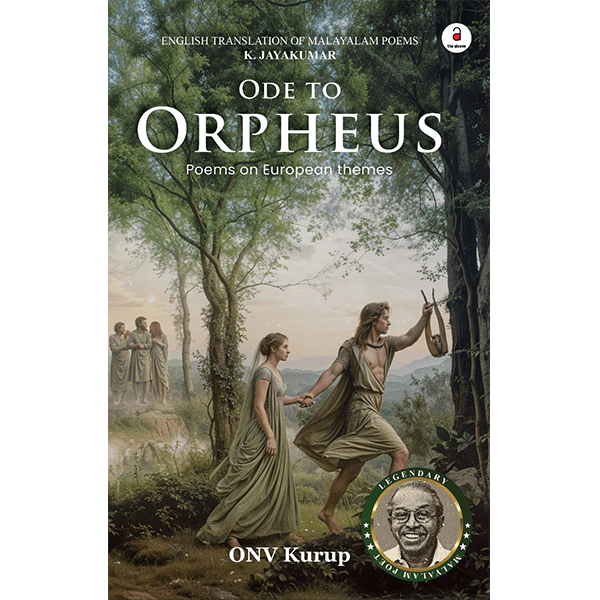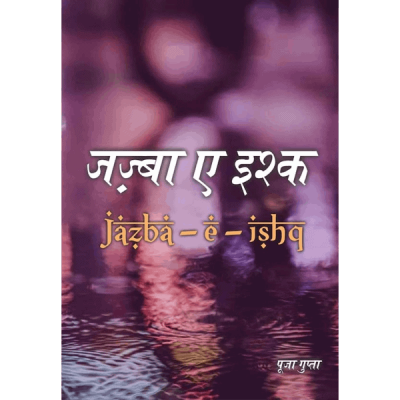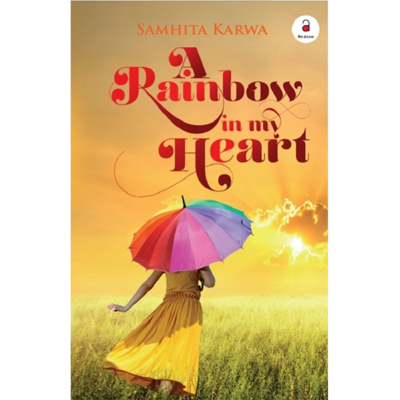ABOUT THE BOOK
‘Ode to Orpheus: Poems on European Themes’ by O.N.V. Kurup is a unique collection of poems by the celebrated Malayalam poet ONV Kurup on themes from Greek mythology and other mythological and historical characters, poets, musicians and situations. Eurydice and Helen, Michael Angelo and Beethoven come alive in these poems with contemporary relevance. In these exquisite poems, the past becomes a mirror to the present. ONV who has travelled extensively in Europe and the Soviet Union, is overwhelmed by the invisible presence of his icons like Pushkin and Mayakovski. He pays homage to Tolstoy at Yasnaya Polyana and Karl Marx at the Highgate Cemetery. Orpheus, that symbol of undying inspiration comes to life as a favourite source of poetry and love.
These poems help the reader peep into the wide horizon of ONV’s poetry, that weaves patterns of truth, life and beauty. They blend the local with the universal, the past with the present, the East with the West, and the ephemeral with the eternal. This anthology features thirty Malayalam poems sensitively translated into English by K. Jayakumar, (a poet who had a deep personal association with ONV). It also has a section narrating the comprehensive literary biography of ONV. It is a book of delightful surprises promising unique insights into the poet’s sensibility and concerns.
ABOUT THE AUTHOR
ONV Kurup
(1931-2016)
ONV Kurup occupies an unassailable position in Malayalam poetry. Spanning more than six decades, his poetry evolved in content and form from concerns of the peasant and the worker of his native village Chavara near Kollam expressed in simple verses to universal and impersonal themes of ethical, ecological and existential dimensions amplified by sophisticated imagery and forms. However, central to his long creative journey is the unwavering faith in the right of the individual for dignity and freedom.
ONV has created several narrative poems based on themes from the Mahabharata (Swayamvaram, Mrugaya), on personal reflections (Snehichu Theerathavar, Dinaantham) and the life and love of Kalidas (Ujjaini.) His poems anthologized in over thirty volumes explore environmental concerns, turbulence of the times, injustice to women, Indian conditions, abiding human relationships, thwarted freedoms and aspirations, the unflagging spirit of the poor and the neglected and a spectrum of socio-emotional issues.
Some of the important anthologies are Mayilppeeli (Peacock Plume), Uppu (Salt), Agnishalabhangal (Fireflies), Karutha Paskhiyude Paattu (Song of the Black Bird) Sharngakappakshikal (Sharngaka Birds), Bhoomikku Oru Charamageetham (A Requiem for Earth), Bhairavante Thudi (Bhiarava’s Little Drum), Ee Puraathana Kinnaram (This Ancient Lyre), Sooryante Maranam (Death of the Sun) etc.
ONV had a highly successful career as a lyricist. As a young poet–lyricist, he started writing inspiring and melodious songs for popular dramas from the 1950s and later for several hundred films, winning widespread acclaim and awards from the State and Central Governments.
After post-graduating in Malayalam, ONV Kurup joined Government service as a College lecturer in 1957 and retired as Professor.
ABOUT THE TRANSLATOR
Jayakumar is a bilingual poet, translator and author. Born on October 6, 1952, in Kerala, he has charted a distinguished career in the Indian Administrative Service (IAS) and literature.
Author of forty-seven books in English and Malayalam, including twelve anthologies of poems, and translations of Tagore, Kahlil Gibran, Rumi and Kabir, he has won several awards including that of Kerala Sahitya Academy. Besides, he is a popular lyricist in Malayalam cinema, with over five hundred songs to his credit.
He retired as the Chief Secretary of Kerala after an illustrious career in the State and Central Governments.
As the founding vice-chancellor of Malayalam University, he played a pioneering role in higher education and excelled as an institution builder.
He has also made a mark in scripting, film making and painting.
This is his second book of ONV Kurup’s poetry in English translation.



